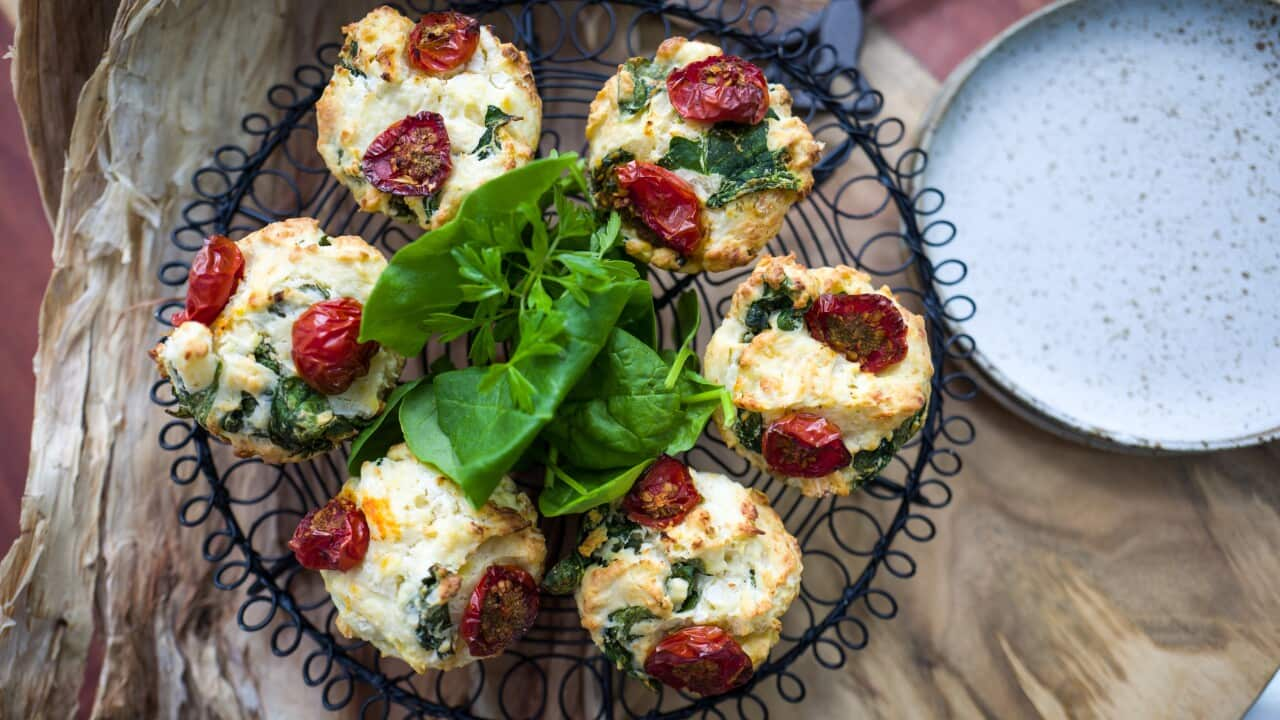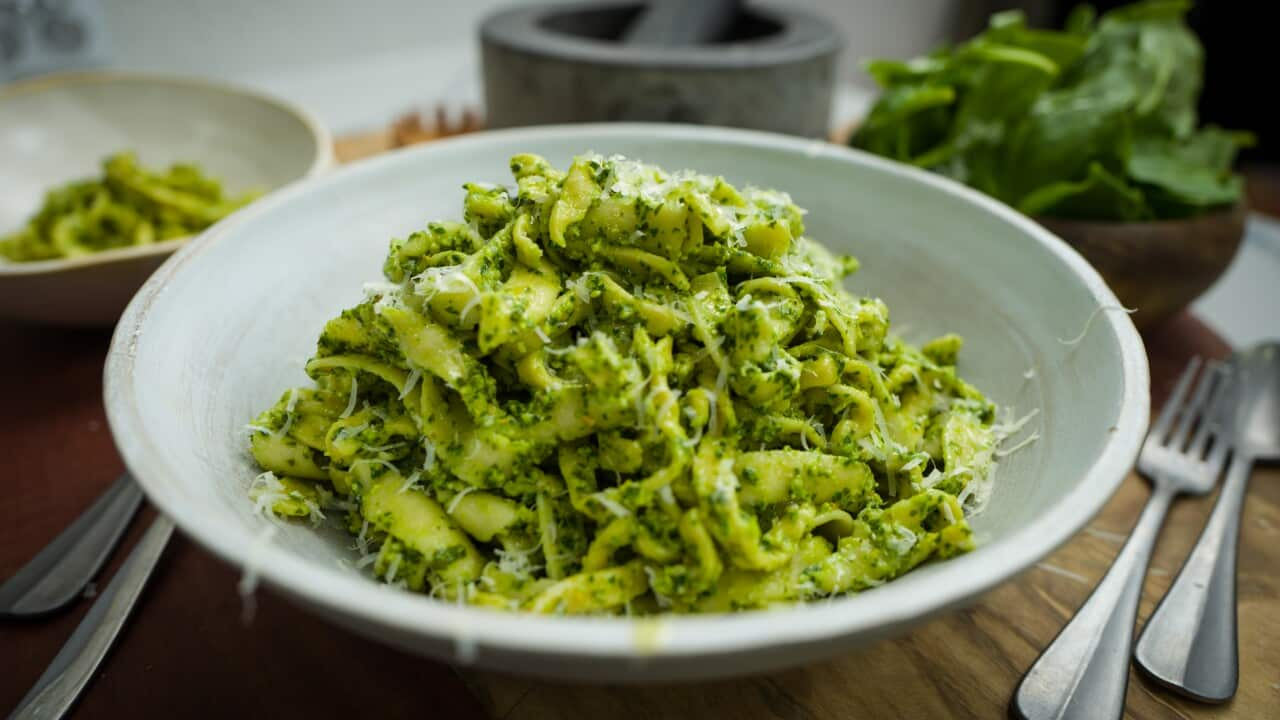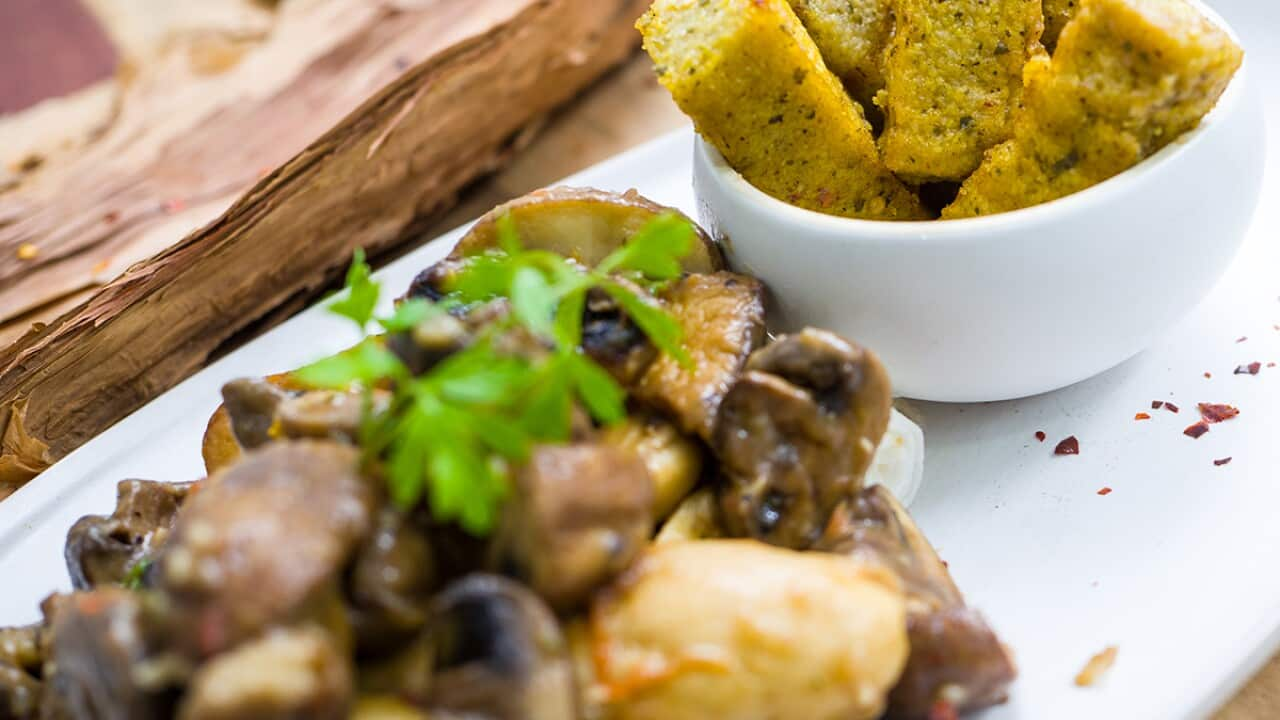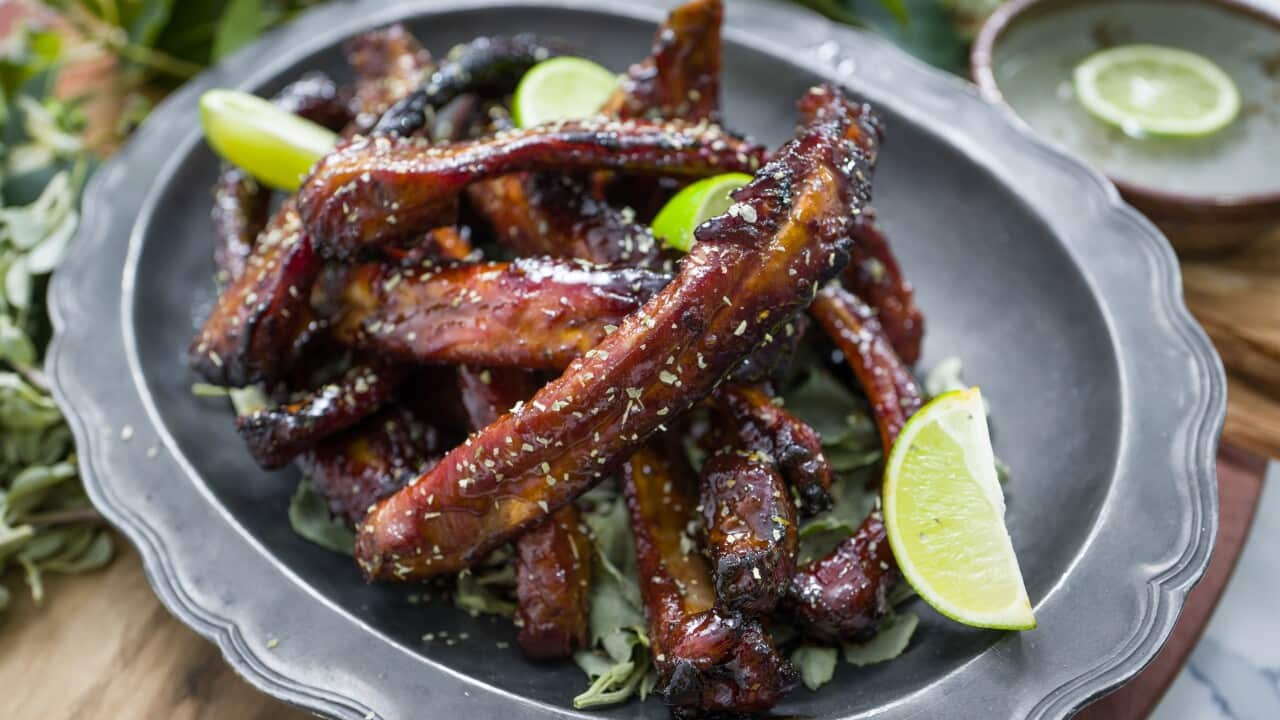NAIDOC Week is a national celebration of Aboriginal and Torres Strait Islander peoples, history and culture, and runs from July 8-14. Join the conversation #NAIDOC2024
As the National NAIDOC Principal Media Partner and official Education Partner, National NAIDOC Week will be celebrated across all SBS channels and platforms, including an exclusive and NAIDOC education resources via .
Australia and the world are becoming increasingly curious about our native food and cooking practices. Fortunately, there's a growing number of Indigenous businesses that are bringing traditional cultural knowledge to this native food revolution. These businesses and communities deserve our support to keep bringing their passion, traditional knowledge and vast culinary history to the Australian food story.
We can't feature everyone, though we'd like to. For more brilliant Aboriginal food businesses, check out , and .
If you're planning a trip to Tasmania, don't forget to book yourself an experience with Palawa Kipli. Managed by Kitana Mansell, Palawa Kipli provides catering, cultural dining experiences and bush tucker tours. Not heading there soon? You can also catch Kitana on .
Nyul Nyul man Robert Dann turns wild boab nuts from Winnawall Country in the Kimberley into beer and iced tea. “We are creating employment for the younger ones," says Dan. "If we get three tonnes this dry season, they’ll have a job for two months, Monday to Friday for five hours a day."
If you're keen to start growing your own bushfood garden, get in touch with Yaegl man Clarence Bruinsma and Gadigal man Adam Byrne at Bush To Bowl. They provide native landscaping that works with the surrounding environment to provide food for both humans and native species.
They also sell fresh native produce like lemon myrtle, native basil and saltbush, as well as tube stock of native plants for you to add to your own garden - apple berry, native raspberry, aniseed myrtle, kangaroo apple, warrigal greens, and plenty more. They also offer bushfood tours, workshops and school programs.
Bush to Bowl
0431 819 089
Proud Wiradjuri Yinaa of the Galari (Lachlan) River, Fiona Harrison makes fine chocolates flavoured with Australian native botanicals like wild rosella, Illawarra plum and lillipillies.
The chocolate is all made by hand in the tiny town of Millthorpe in central NSW by Fiona and her business partner Jo.
"Chocolate On Purpose is more than just confectionery," she told SBS Food. "This chocolate enables us to have the conversations about the wisdom of First Nations people and their use of Australian botanicals, so they're recognised for their wisdom and appreciated for their culture. We see that as a small cog in the wheel of reconciliation."
Chocolate on Purpose
0413 508 638
DHUWA means to 'feel alive' in Bidjara language, which seems a particularly fitting name for a coffee brand.
“As a modern Indigenous-owned, managed, and controlled business, we believe a great cup of coffee connects us as we share stories, build bonds, and nourish relationships," says proud Mununjali Palawa man and DHUWA Co-founder Shawn Andrews. "We call it ‘reconciliation in a cup’.”
The bigger picture behind DHUWA is to create a successful coffee enterprise that is soon able to train and employ Indigenous people and in so doing, contribute to their communities. DHUWA roasts in partnership with Griffiths Bros Coffee Roasters.
Five per cent of every DHUWA Coffee product sold in Woolworths is donated to charity partner Dreaming Futures which supports Aboriginal and Torres Strait Islander children in out of home care to experience Country, culture and connection.
DHUWA Coffee
From their café and retail outlet in Mudgee, the team behind the award-winning Indigiearth source native Australian foods from Aboriginal communities who use traditional land management practices that respect the land. Founder Sharon Winsor, a Ngemba Weilwan woman, is passionate about connecting people with Aboriginal culture and heritage through native foods.
The brand offers over 200 products, including native foods, candles, diffusers and an all-natural skincare range. Their raw native fruits, produce and materials are purchased from Aboriginal communities across the Country ensuring that employment, income and education remain within the community.
“Indigiearth is more than just business. It’s my healing, my passion and runs deep within my soul,” says Sharon.
Indigiearth
83 Lions Drive Mudgee, NSW
1300 551 525
Buy bushfood plants and produce directly from Indigigrow and support their positive cultural and environmental education projects. They are also on a mission to save and protect native plants like the critically endangered Eastern Suburbs Banksia Scrub.
The company has an education facility, nursery and bushfood farm within the grounds of La Perouse Public School.
Indigigrow
First Pedestrian Gate
Corner of Bunnerong Road & Yarra Road, La Perouse Public School, La Perouse NSW
0439 327933
Kaiyu Superfoods use Australian native fruits and foods to create enjoyable products that showcase the health benefits of Australian native fruits through their products. That means things like native superfood blended powders, native teas and infusions, and snacks like sun-dried bush tomatoes and sandalwood nuts are all . They source organically and locally where possible and work with and mentor communities to wild harvest fruits sustainably.
Kaiyu Superfoods
Humpty Doo, NT
0429 424 024
This 100% Indigenous-owned bushfood-tech company was started by Ben Tyler, a Bininj entrepreneur and children's author from Murdudjurl in the heart of Kakadu National Park, NT. The company's current project is a limited edition series of alcohol-free native cocktails, a collaboration with ALTD Spirits.
Ethically sourced, wild-harvested organic bush food, straight out of the Central Desert and gathered by women on Country. Founder Rayleen Brown's passion for cooking with Indigenous foods was born at her mother and father's side as a young girl. Her father, fortunately, wrote down all of his recipes to be passed down to his kin.
Rayleen started out catering for meetings and festivals 18 years ago, and her business has grown to include bush food products, a café, traineeships and her family.
"I hope I leave a legacy for the younger generation, my own family and my extended family," Rayleen says on her website. "To be proud of who we are and our culture, to have respect for it, passed down from generation to generation, living through our grandmother's story."
Kungas Can Cook
Irrarnte Cafe
Desert Knowledge Precinct, 457 Stuart Highway, Alice Springs
READ MORE

The art of cooking with bush foods
The extraordinary Komet woman Nornie Bero is the head chef and business owner of Mabu Mabu. Originally from Mer Island in the Torres Strait, she has been a professional chef for over 20 years. Nornie is on a mission to put Indigenous ingredients in kitchens across Australia.
Under the label Kara Meta, Mabu Mabu make and stock a great range of handmade teas, spices and sauces with Indigenous and tropical flavours. They are all sourced from suppliers who are passionate about Australia's Indigenous food industry and everything is gluten free and vegan.
There's also an all-day bar and kitchen based on the land of the Wurundjeri and Boonwurrung peoples at Federation Square in Melbourne/Naarm. The venue is called Big Esso, or "the biggest thank you" in Torres Strait Islander slang.
Mabu Mabu
Established in 2018, the team at Maningrida have sold wild native foods sustainably harvested from both land and sea on their Arnhem Land homelands in the Northern Territory. The business is fully owned and operated by Bawinanga Aboriginal Corporation with the mission of creating job opportunities that allow people to continue to live on Country.
Locals can purchase fresh produce like fish and native greens. Their unique spice mixes are available Australia-wide through stockists or directly from their
Maningrida Wildfoods
This native food Indigenous co-op has been going strong for 15 years under the management of Aunty Pat Mamanyjun Torres.
“For us, bush food is more than just a commodity. It’s something that reaches back into ancestral history,” Aunty Pat told . “With it comes sacred rituals and songs and stories. It’s very much embedded in who we are as humans.”
They follow the traditional methods of wild harvesting in small batches throughout the six seasons found in West Kimberley, on their traditional family lands in Ngumbarl and Jabirr-Jabirr Country. (Gabiny) is one of the foods they are using traditional land management skills to help preserve for future generations.
A big part of Mayi Harvests philosophy is giving back to their community. They do this through volunteering, mentoring, sharing culture and educating others on their proud Indigenous history. Mayi Harvests also run native bushfoods workshops on Country.
Mayi Harvests
20B Clementson St, Broome WA0403 486 955
What Aunty Dale Chapman doesn't know about the Indigenous food of the Gubbi Gubbi, simply doesn't exist. Her deep cultural pride urged her to start My Dilly Bag 20 years ago. She hosts workshops, tours, cooking classes and other events, all to share her fathomless knowledge of and passion for Aboriginal culture.
“We are bringing out a whole new range of bush foods, with more herbs and fruit coming on the market," Aunty Dale told SBS. "And that's due to the influx of Indigenous people growing bush foods.”
To meet the needs of a nation during a pandemic, Aunty Dale also started hosting online cooking classes; she also offers webinars for education providers and more.
My Dilly Bag
5B/354 Mons Rd, Forest Glen QLD
0402 616 056
National Indigenous Culinary Institute
The National Indigenous Culinary Institute (NICI) is an industry-inspired and initiated program to create highly skilled Indigenous chefs. It aims to train, mentor and support First Nations people to become world-class chefs. The program has graduates and new apprentices in top restaurants, including at Rockpool Bar and Grill and Bistro Guillaume in Sydney.
In addition, the team create cultural cooking experiences for corporate partners, where they deliver meal boxes with native ingredients and their Aboriginal chefs teach participants how to use and cook them.
"It's a way to engage corporates in a larger scale opportunity rather than just a morning tea, where the thought is nice but quickly forgotten," says NICI CEO and Yuin man, Nathan Lovett. "This is an experience that won't be soon forgotten."
NICI
Nyanda Aboriginal Cultural Tours and Bush Foods Experience offer immersive, highly interactive experiences that connect people to Australia's Aboriginal history and experience. Seasonal bushfoods are offered at every tour and foraging and hunting techniques are shared.
Nyanda is home to a bora, or traditional ceremonial site, one of only two that remain in Brisbane. Supporting Nyanda is a way to support the preservation of this culturally significant, sacred Jagera site.
Nyanda Cultural Tours
52 Childs Rd, Nudgee QLD
0435 795 337
On the Niigi Niigi headland (known as Sealy Lookout) at Coffs Harbour, there's a little café run out of a van that serves the best picnic grazing boxes around. Launched during NAIDOC in 2017, the café is part of the Bularri Muurlay Nyanggan Aboriginal Corporation, which puts 100% of its profit back into the community. The business has since added a second location at Toormina.
Nyanggan Gapi means 'perfect coffee' in the Gumbaynggirr language and this not-for-profit Aboriginal-owned and run café serves exactly that, and then some. The menu uses local bush flavours like lemon myrtle, ground wattleseed, Davidson plums and native finger limes, sourced where they can from Aboriginal-owned businesses.
"I think it is very important for our staff to be educated on how traditional foods were used," café manager Kamla Webb told SBS Food. "When they pass on the knowledge to our customers, they can feel the passion for the culture and also provide an opportunity to educate customers on how alive the culture is, especially in Gumbaynggirr Country."
Nyanggan Gapi Café
Office: 1 Bray Street, Coffs Harbour NSW; Cafe locations: Sealy Lookout, Coffs Harbour NSW on Thurs-Sunday (extended days during school holidays) and The Link, Toormina (Monday to Saturday).
0409 536 670
Australia's first non-alcoholic craft beer company is run by husband-wife team Gamilaroi man and psychologist Clinton and Loren Schultz on beautiful Yugambeh Country. Through their range of brews, the pair want to break down the stigma of socialising sober and raise awareness of Aboriginal arts, language and history. Sobah also has a cafe at the Burleigh Heads brewery.
"While we’re hard workers, we truly believe we have been privileged in our opportunities thus far and therefore have a responsibility to give back," the pair say on their website. "To share our knowledge and experience, to create opportunities for others, to encourage sustainable and healthy ways of living, and to assist in bringing about positive changes."
Sobah
Unit 1, 314 Burleigh Connection Road,
Burleigh Heads QLD 4228
Phone: 0755221376 / 0438382707
At the heart of Something Wild's Indigenous food business is a strong desire to respect, support and promote Indigenous harvesters and provide economic opportunities for Aboriginal people. The result is an unparalleled ability to bring unique, ethically sourced Australian native produce, spirits and game to the table.
Specialities include green ants and magpie goose, kangaroo, open range boar, goat, crocodile, emu, camel and wild and farmed venison. Green ant gin or native yam vodka are definitely something to try.
The team supply Indigenous produce to some of Australia's top restaurants, as well as to the Australian public from their website and at their popular staff at Adelaide's historic Central Market.
Something Wild
Stall 55, Adelaide Central Market
44-60 Gouger Street, Adelaide SA
08) 7120 7367
READ MORE

What’s the deal with wild foods?
Warndu means good in the Adnyamathanha language, native to the Flinders Ranges Country in South Australia. All of their products contain one or more native ingredients and all are made in Australia from 100% locally sourced, seasonal and wild-harvested produce.
This includes products like native thyme oil, wattleseed balsamic, whole dried bush tomato, bush tomato and macadamia dukkah, native mint and green ant tea, and a chai latte made with wild Manuka honey, rose and bush spices.
Their website is also packed with recipes using and information on Aboriginal bush tucker ingredients. And don't miss the the team have developed. They also have a celebrated cookbook called Warndu Mai (Good Food) and more recently, the First Nations Food Companion.
Warndu
Cook from Warndu Mai
Cook something good

Oven-dried tomato, warrigal greens and goat’s cheese muffins




















